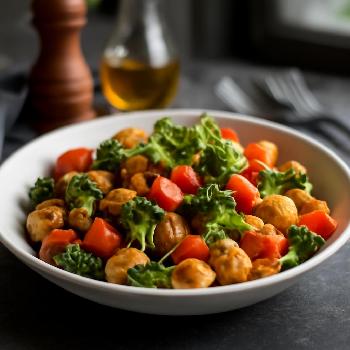Cooking Tips > Troubleshooting > Common Cooking Problems > How can I fix bland-tasting food?
How can I fix bland-tasting food?
Discover simple yet effective techniques to rescue bland dishes and transform them into flavorful masterpieces. Learn how to balance flavors, enhance depth, and add that missing 'oomph' to your cooking. This guide covers essential seasoning strategies, ingredient additions, and cooking methods to revive even the most lackluster meals.

The Importance of Salt
Salt is the foundational flavor enhancer in almost every cuisine. It doesn't just make things taste 'salty'; it amplifies the existing flavors of the ingredients. If your dish tastes bland, the first step is to taste and add salt judiciously, a little at a time. Use a good quality salt, like kosher salt or sea salt, for the best flavor. Pro Tip: Salt early in the cooking process. This allows the salt to penetrate the ingredients more effectively.
Acidic Awakenings
A touch of acid can brighten up a bland dish. Think of lemon juice, lime juice, vinegar (balsamic, red wine, rice), or even a splash of hot sauce. Acid cuts through richness and adds a zesty dimension that can awaken your taste buds. Start with a small amount and taste, adjusting until you reach the desired level of brightness. Example: A squeeze of lemon juice in a creamy soup or a dash of vinegar in a chili can make a huge difference.
Spice it Up
Spices are a potent weapon against blandness. Consider adding a pinch of red pepper flakes for heat, smoked paprika for smokiness, cumin for earthiness, or garlic powder for savory depth. Experiment with different spice combinations to find what works best for your dish. Fresh herbs like parsley, cilantro, or basil can also add a burst of freshness and flavor. Important: Dried herbs and spices should be stored properly and replaced regularly to maintain their potency.
Umami Boosters
Umami, often described as savory or meaty, adds depth and richness to food. Ingredients like soy sauce, fish sauce, mushrooms, Parmesan cheese, and sun-dried tomatoes are all excellent sources of umami. Adding a small amount of one of these ingredients can significantly enhance the overall flavor profile of a bland dish. A teaspoon of soy sauce in a stew or a sprinkle of Parmesan on pasta can make a world of difference.
Fat is Your Friend
Fat carries flavor. Adding a knob of butter, a drizzle of olive oil, or a splash of cream can add richness and depth to a bland dish. Consider using flavored oils or infused butters to further enhance the flavor. Fat also helps to mellow out harsh flavors and create a more balanced taste. Note: Be mindful of the type of fat you use. Olive oil is great for Mediterranean dishes, while butter is better suited for French or Italian cooking.
Sweet Sensations
A touch of sweetness can balance out savory flavors and add complexity to a dish. Consider adding a small amount of honey, maple syrup, brown sugar, or even a few drops of balsamic glaze. Start with a tiny amount and taste, adjusting as needed. Sweetness can also help to caramelize ingredients and create a more appealing texture.
Building Layers of Flavor
Often, blandness stems from a lack of depth in the cooking process. Building layers of flavor means adding ingredients at different stages of cooking to create a more complex and nuanced taste. For example, sautéing onions and garlic before adding other ingredients, or deglazing a pan with wine or broth, can create a richer and more flavorful base. Key takeaway: Don't be afraid to experiment and taste as you go. Cooking is an art, and finding the right balance of flavors is key to creating delicious meals.
FAQ
-
I added salt, but my food is still bland. What should I do?
Consider adding an acid like lemon juice or vinegar to brighten the flavors. Also, make sure you're using enough salt; a pinch might not be enough. Taste and adjust until you reach the desired level of seasoning. -
I'm trying to eat healthy. Can I fix bland food without adding too much fat?
Yes! Focus on using herbs, spices, and acidic ingredients like lemon juice or vinegar to add flavor without adding extra fat. Umami-rich ingredients like mushrooms or sun-dried tomatoes can also help boost flavor without significant fat content. -
How do I avoid over-seasoning my food?
Add seasonings gradually and taste frequently. It's always easier to add more seasoning than to take it away. Start with small amounts and adjust until you reach the desired flavor profile. Keep in mind that flavors will often intensify as food cooks down. -
My dish tastes bland even after adding spices. What could be the problem?
The spices may be old and have lost their potency. Try using fresh spices or replacing your older ones. Also, consider toasting your spices in a dry pan before adding them to the dish; this can help to release their aromas and enhance their flavor.
